Following the writer’s eightfold path to a fulfilling writing practice
February 13, 2021
When I read Embodied Resilience through Yoga: 30 Mindful Essays About Finding Empowerment After Addiction, Trauma, Grief, and Loss I was reminded that writing too is empowerment.
The writing in Embodied Resilience has enabled the contributors, of which I’m one, to liberate our inner voice, free sometimes painful words, observe them from a different perspective and tell our story to people we want to help and inspire.
What a gift!
On the more practical side, in today’s yoga world – especially online – it’s a huge advantage to a yoga teacher, studio owner, changemaker or anyone promoting the work of an organization to be able to communicate powerfully and effectively through writing.
You may even be able to have your writing published by a website or magazine. Even if you’re not paid for your contribution – rightly or wrongly, the yoga media often sees publishing your writing as a fair exchange for promoting you – you raise your profile, extend your network and improve your writing skills.
But where do you start and, more importantly, how do you keep going?
I’ve written for a living all my working life and I practice yoga. I’m the author, co-author and ghostwriter of more than 20 books. My writing is published regularly in yoga magazines. I mentor writers. I’ve created the Eightfold Path to a Writing Practice to share my knowledge and experience.
May it set you free to find your way further into writing.
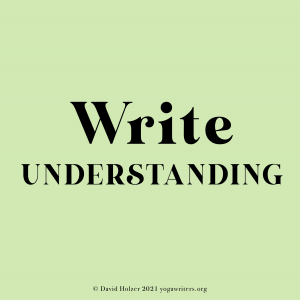
Understand that it’s the act of writing that counts, not wanting to be a writer. If you write, you’re a writer.
Wanting to be a writer presupposes an ideal of what a writer is. Like you, they’re just someone who writes.
But it’s a good idea to read all you can about how writers work and take from this what helps you.

The most powerful writing always begins in fearlessness. Have the courage to go past all the stop signs in your mind.
Your willingness to share things about yourself that you may have wanted to hide will make your readers feel less alone.
But be careful when you’re writing about someone else. Think about how your writing will be received and your readers’ feelings.
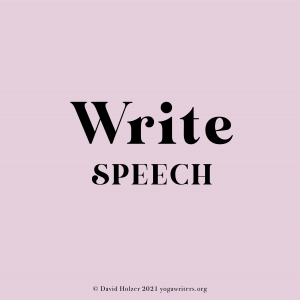
Telling people about what you’re writing too soon will allow the energy that should be going into your work to escape.
On the other hand, announcing that you’re writing a novel, let’s say, will make it embarrassing for you to give up.
Writers who want to publish need a sounding board but be prepared for honest answers. Be grateful and learn from them.

Be proud of yourself for showing up at your keyboard or opening your notebook. Whatever writing you do is an achievement.
Don’t see your writing project as a mountain to be climbed. Focus only on that day’s writing and enjoy the practice.
Start. Keep going. And going. Before you know it, you’ll be looking at a body of work that will surprise you.
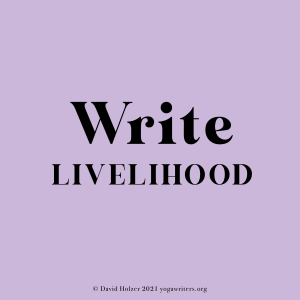
If you write for money, write only about what you believe in, can stand behind. All you have is your name.
There’s nothing wrong with writing about something you’re not especially interested in as long as it doesn’t go against your beliefs.
Use every piece of writing you do as an opportunity to refine your writing skills, to write better, to communicate better.
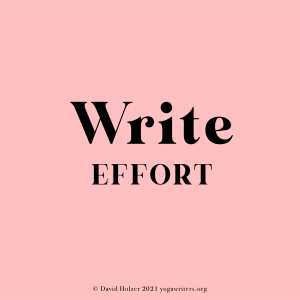
Write every day, even if only for a few minutes. Remember you’ll feel differently about your writing depending on the day.
Experiment with knowing when to stop. It’s not necessarily useful to write a few thousand words one day and then nothing.
Don’t ignore your physicality. Everything you write arises out of who you understand yourself to be and that includes your body.
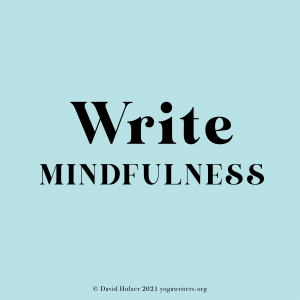
Be mindful of why you want your writing to be read. What do you want your readers to feel, to do?
But remember that, no matter how hard you try, you will have no control over how your writing will be received.
And, if your writing is being misinterpreted, ask yourself why. Was your intention honorable? Are you not communicating clearly? Fix it.
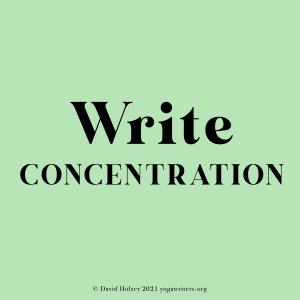
The inspiration to write something might come to you in a flash but making it good always takes hard, focused work.
If you want your writing to be read, accept that you will have to rewrite at least one time probably more.
For most writers, rewriting is writing. Think of it as all part of getting better and better at what you do.

David Holzer writes about yoga for magazines and websites. He teaches yoga for writers and writing for yogis. Hundreds of people have benefited from his Secret Writing Mantra course on DailyOM. David also mentors writers. Find out more here.
Author photo by Ida Carlsson, used with permission. Eightfold Path designed by Jason Hyde.
